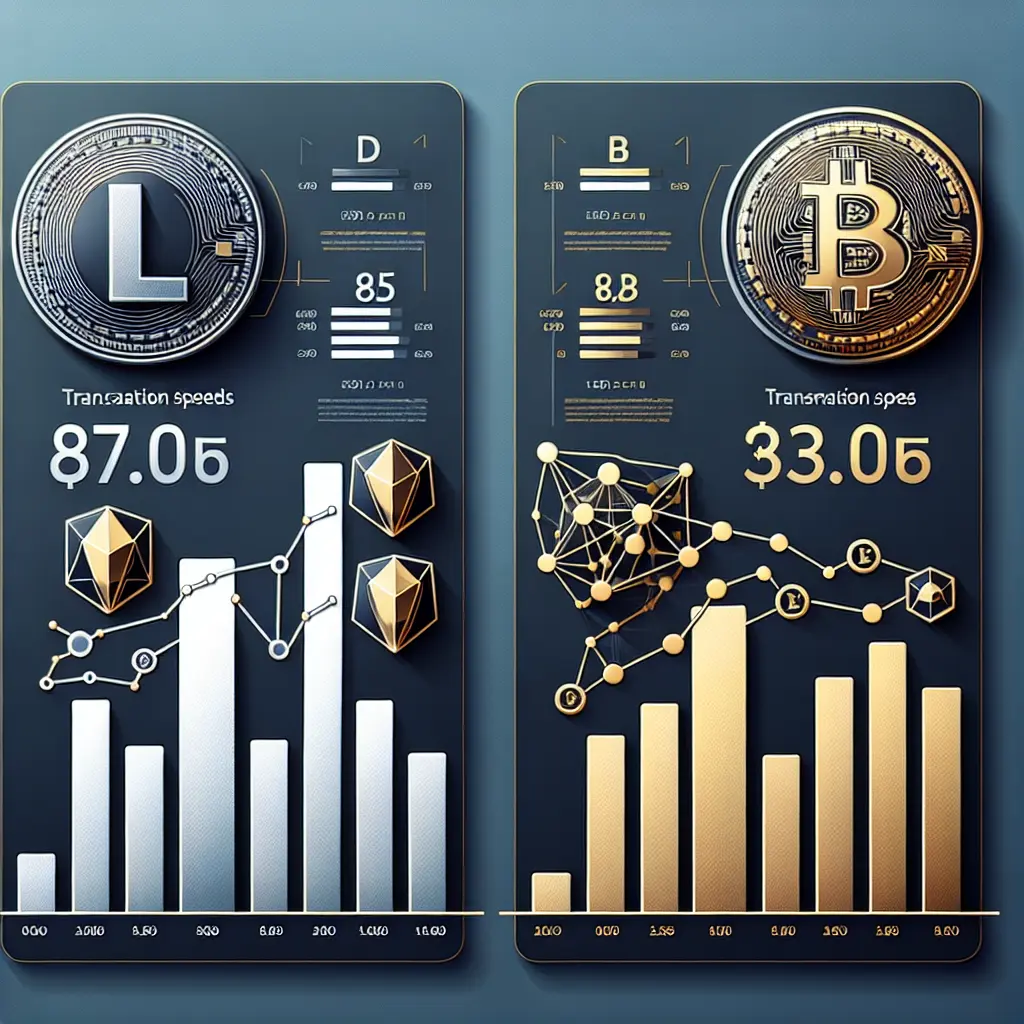
In the dynamic world of cryptocurrencies, comparing transaction speeds and fees between major players like Litecoin (LTC) and Bitcoin (BTC) provides valuable insights for investors, traders, and enthusiasts. This post delves into the intricate details of the Litecoin vs Bitcoin comparison, focusing on aspects such as transaction speeds, fees, and overall efficiency.
Transaction Speeds: Litecoin vs Bitcoin
One of the most critical factors when evaluating cryptocurrencies is their transaction speed. Litecoin was created by Charlie Lee in 2011 with the explicit goal of being the "silver" to Bitcoin's "gold." One of Litecoin's primary enhancements over Bitcoin is its faster transaction confirmation times. While Bitcoin transactions typically take about 10 minutes to confirm, Litecoin transactions are much quicker, with an average confirmation time of just 2.5 minutes. This makes Litecoin a preferable option for merchants and users looking for faster cryptocurrency transactions.
Litecoin vs Bitcoin Fees
Transaction fees are another crucial factor in the Litecoin vs Bitcoin comparison. Due to its larger block size and quicker block time, Litecoin generally offers lower transaction fees compared to Bitcoin. As of the latest data, the average transaction fee for Bitcoin stands at around $2.79 per transaction, while Litecoin's average fee hovers around $0.04. This stark difference makes Litecoin more appealing for users who engage in frequent transactions or small-value transfers.
Cryptocurrency Fee Comparison
The disparity in fees between Litecoin and Bitcoin can largely be attributed to the differences in their block generation times and the scalability solutions each network has implemented. Bitcoin, with its more extensive adoption and network congestion, often sees higher fees, especially during peak transaction periods. In contrast, Litecoin’s design allows for more transactions to be processed at a lower cost, enhancing its efficiency.
LTC vs BTC Transactions
When analyzing LTC vs BTC transactions, it's essential to consider not only fees and speeds but also market acceptance and security. Bitcoin, being the first cryptocurrency, enjoys broader acceptance as a payment method and is considered more secure due to its extensive proof-of-work algorithm. However, Litecoin's advantages in speed and cost make it an attractive alternative for users who value efficiency and affordability in their daily transactions.
Recent News Impacting Transaction Dynamics
Several recent news events have had implications for both Bitcoin and Litecoin transactions. For instance, the ongoing saga of Mt. Gox, which recently announced plans to repay investors in Bitcoin and Bitcoin Cash, has caused significant ripples in market prices and transaction volumes source. Similarly, the news of Bitcoin potentially slumping below $59,000 amid market uncertainty contrasts sharply with its surge past $68,000 due to continued ETF inflows source.
Moreover, geopolitical and regulatory news also plays a role. For instance, the German government’s decision to continue Bitcoin transfers to exchanges indicates a growing acceptance of cryptocurrencies at governmental levels source. Additionally, high-profile events like 'Bitcoin 2024', which announced Donald Trump as a speaker, could influence market sentiment and transaction volumes significantly source.
Litecoin vs Bitcoin Efficiency
In terms of efficiency, both networks strive to improve their protocols. Bitcoin has implemented solutions like SegWit and is exploring further enhancements through the Lightning Network to increase its transaction throughput. On the other hand, Litecoin has always been at the forefront of adopting technological improvements, including SegWit, which was activated on Litecoin before Bitcoin.
The Impact of Broader Market Trends
The broader market trends also affect the transaction speeds and fees of cryptocurrencies. The integration of cryptocurrencies into traditional financial systems, as seen with recent ETF approvals, creates fluctuations in transaction volumes that can impact network congestion and fee structures source.
Conclusion
In conclusion, both Litecoin and Bitcoin offer unique advantages and face distinct challenges. Litecoin’s faster transaction times and lower fees make it an excellent option for smaller, more frequent transactions. Conversely, Bitcoin remains the go-to cryptocurrency for those looking for broader market acceptance and arguably better security.
As we continue to monitor the ever-evolving cryptocurrency landscape, it’s clear that both Litecoin and Bitcoin will play significant roles in shaping the future of digital transactions. Whether one is superior to the other depends largely on individual needs and market conditions.
Thank you for joining me on this deep dive into the world of Litecoin vs Bitcoin efficiencies, speeds, and fees. Keep tuning in for more insights into your favorite cryptocurrencies!
June Hicks